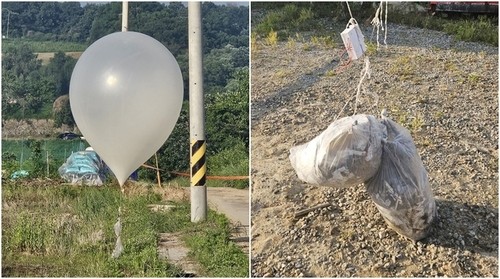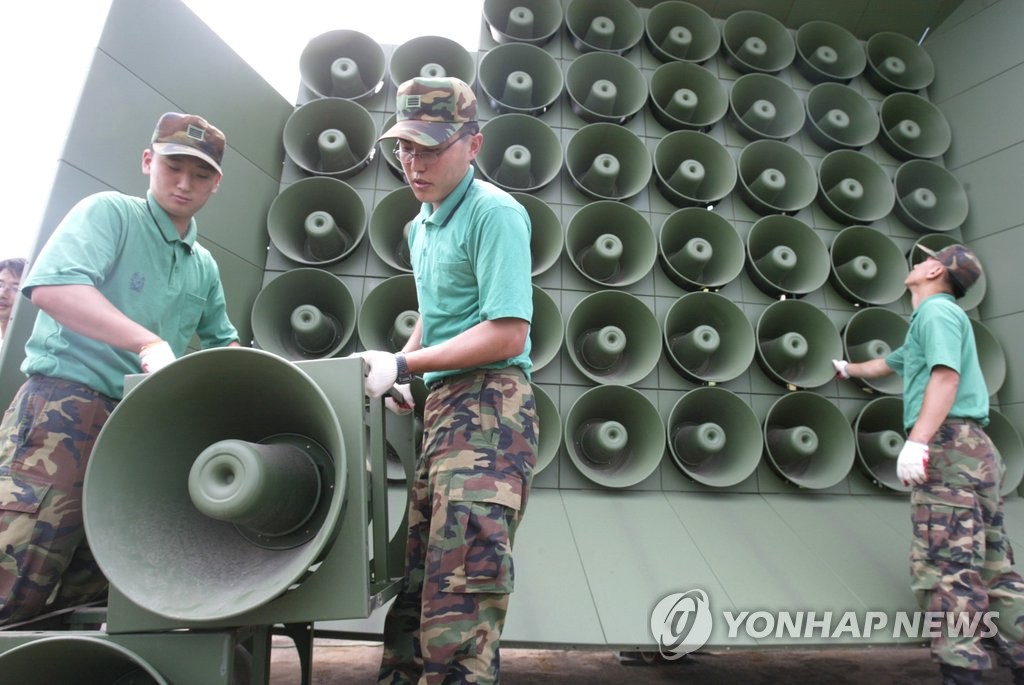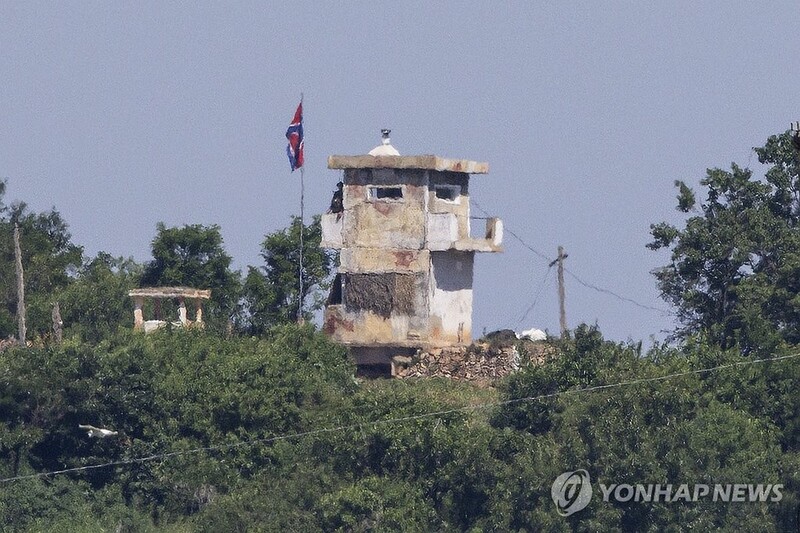(News Focus) 2018 military accord-suspension
 |
| ▲ This file composite photo, provided by an individual in the border city of Paju, 37 kilometers northwest of Seoul, on May 29, 2024, shows balloons sent by North Korea carrying trash. (PHOTO NOT FOR SALE) (Yonhap) |
 |
| ▲ This file photo, released on Aug. 11, 2015, by the defense ministry, shows South Korean soldiers installing loudspeakers at an unidentified site on the western front line bordering North Korea to resume its anti-Pyongyang propaganda broadcasting. (PHOTO NOT FOR SALE) (Yonhap) |
 |
| ▲ A North Korean soldier stands guard at an outpost near the inter-Korean border in this photo taken June 3, 2024, from South Korea's border city of Paju, 37 kilometers northwest of Seoul. (Yonhap) |
(News Focus) 2018 military accord-suspension
(News Focus) S. Korea's plan to halt 2018 military pact heralds loudspeaker broadcasting resumption, border training against N.K.
By Chae Yun-hwan
SEOUL, June 3 (Yonhap) -- South Korea's plan to suspend a 2018 inter-Korean military agreement in its entirety will pave the way for Seoul to resume loudspeaker broadcasting along the border, a key tool for psychological warfare against North Korea, and hold front-line military training.
Earlier in the day, the presidential National Security Council decided to halt the inter-Korean military accord until mutual trust is restored in response to the North's massive sending of trash-carrying balloons into South Korea.
Since Tuesday, the North has sent around 1,000 balloons carrying trash in what it said was a tit-for-tat campaign against South Korean activists sending balloons carrying propaganda leaflets denouncing the North's regime.
"This measure will enable military training near the Military Demarcation Line, which has been restricted by the agreement, and allow for more adequate and immediate responses to North Korean provocations," the presidential office said.
The move, set to be officially approved in a Cabinet meeting Tuesday, will effectively scrap the military tension reduction accord amid increased questions over its effectiveness.
Signed on Sept. 19, 2018, at the height of a reconciliatory mood when then liberal President Moon Jae-in traveled to Pyongyang for summit talks with North Korean leader Kim Jong-un, the deal included setting up a land buffer zone, where artillery drills and regiment-level field maneuvers are to be suspended, and maritime buffer zones, where artillery firing and naval drills are to be banned.
It also designated no-fly zones near the border to prevent accidental aircraft clashes.
But since late last year, the two Koreas have taken steps in breach of the deal, with Seoul partially suspending it to resume aerial reconnaissance near the border in response to the North's successful launch of a military spy satellite in November.
In turn, Pyongyang has vowed to restore all measures halted under the accord and has rebuilt some guard posts inside the Demilitarized Zone (DMZ) separating the two Koreas, which were demolished under the agreement.
In January, the North's military fired artillery shells into the maritime buffer zone, prompting the South to stage similar live-fire drills on its northwestern border islands for the first time since the signing of the deal.
South Korea's military expects the planned suspension to pave the way for a full-scale resumption of activities to bolster its front-line defenses.
"If the September 19 military agreement is suspended in its entirety ... live-fire drills and exercises (near the border) can take place," a military official said.
The planned suspension has also raised speculation over whether the South will resume broadcasts of its propaganda loudspeakers operated by its front-line units that Pyongyang has reacted furiously against.
The loudspeakers used to blare criticism of the Kim Jong-un regime's human rights abuses, news and K-pop songs, drawing angry responses from Pyongyang.
On Sunday, National Security Adviser Chang Ho-jin said the government will take "unbearable" measures against North Korea in response to its sending of trash balloons.
Hours after Chang's warning, North Korea said it will temporarily stop sending trash-carrying balloons across the border into South Korea, though it also threatened to resume such operations if anti-Pyongyang leaflets are sent from South Korea.
South Korea turned off the speakers in April 2018 after an inter-Korean summit declaration between Moon and Kim at the truce border village of Panmunjom.
While the inter-Korean military agreement does not specify the loudspeaker broadcasts, it bans "hostile" activities, which could cover such broadcasts.
But even if the agreement is suspended, the military is unlikely to immediately resume the broadcasts as the move could invite additional North Korean provocations.
In August 2015, the North fired artillery shells toward the South's western front-line area in response to the South turning on its loudspeakers.
(END)
<저작권자(c) 연합뉴스, 무단 전재-재배포, AI 학습 및 활용 금지>
(C) Yonhap News Agency. All Rights Reserved





































